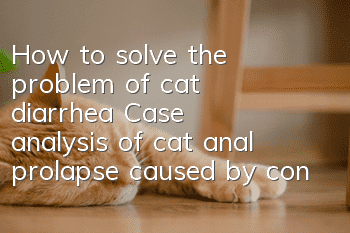How to solve the problem of cat diarrhea? Case analysis of cat anal prolapse caused by constipation!

How to solve the problem of cat diarrhea? Case analysis of cat prolapse caused by constipation! Rectal prolapse refers to the prolapse of the posterior rectal mucosa out of the anus or all of it, commonly known as prolapse. This disease will occur in animals of different ages, but young animals animals are more likely to develop. There are many reasons for this disease, including gastritis, diarrhea, dystocia, constipation, roundworm infection, feeding protein-deficient feed, etc., but the most special case is congenital rectal sphincter weakness that occurs in the early childhood of Boston Terriers. Therefore, this dog is more likely to suffer from anal prolapse than other dogs when it is young. There are many causes of constipation. Feeding dry food for a long time, rarely drinking water, and eating a lot of bones, because bones contain a lot of calcium phosphate, will form stones in the intestines. However, feeding too little does not mean that constipation will occur. Yes, if you eat too little, the stimulation to the intestines will be weakened, the muscles that promote defecation will be weak, and stool will accumulate in the intestines.
Boston terrier with congenital rectal sphincter weakness
Boston terrier with congenital rectal sphincter weakness
There are many symptoms of anal prolapse, if it is just mucosal prolapse Usually, when a sick cat defecates, you can see the rectal mucosa exposed outside the anus. If the entire rectum prolapses, you will see a long cylindrical shape, redness, swelling and edema. If it is not treated, the rectum will become black and necrotic if it remains outside, and secondary bacterial infection may lead to ulcers. The symptoms of rectal prolapse are easy to identify, but prolapse of the rectal mucosa from the anus is difficult to identify without careful observation. The sick animals rub the anus on the ground when they want to defecate, but they pass out very little watery stool.
Recently, a prolapsed cat and French bulldog came to the clinic. The main introduction is that the cat is 3 months old, female, with a body temperature of 37.8 degrees Celsius, no vaccinations and deworming, and a weight of 1.8Kg. , the cat’s owner said that he had just adopted the cat for two days and had not had time to get vaccinated, so he hurriedly sent it over. From the outside, the kitten looked very thin. The owner complained that the cat had been in poor spirits for the past two days. He ate and drank less, often vomited, and wanted to defecate but could not. Later, he discovered this There is something hanging outside the anus. The cat had a painful reaction to palpation of the upper abdomen, weak bowel sounds were found on auscultation with a stethoscope, and fecal pellets were found on digital rectal examination. A routine blood test revealed that the red blood cells were low and the white blood cells were high, indicating anemia, malnutrition, and inflammation. According to the owner's narrative and clinical symptoms, it can be diagnosed as anal prolapse caused by constipation. First, clean the fecal balls in the kitten's rectum, and then inject fluids to adjust the electrolytes in the body and supplement nutrition. This kitten's anal prolapse is not very serious. Use 1% disinfectant potassium permanganate to clean the prolapsed part and collect the prolapsed material. Then use the cigarette bag suture method to sew up the anus, but leave a certain amount of space. gaps to facilitate defecation. If it is in the early stage of rectal prolapse, you can use plastic surgery for rectal prolapse. Even if the edema is very slight and the mucosa is not damaged or necrotic, you can first clean the prolapsed mucus hair with 5% alum solution and use acupuncture to prick the edema. After the edema slowly disappears,Then put it back in until it is completely put in. Finally, use alcohol to inject the muscles around the anus to prevent it from coming out again. Another method is that the rectal prolapse is very serious, and ulcers, necrosis, etc. have already occurred. Because it is of no use to reintroduce it at this time, so the rectum is resected, the sick cat is anesthetized, and the affected area needs to be disinfected. , use stainless steel needles to perform cross penetration and fixation at the base of the prolapsed rectum, and then use a knife to remove the entire prolapsed rectum. After the bleeding is stopped, the serosa is sutured with nodules, and then the mucosa is sutured with nodules to bury the serosal layer. Pull out the steel needle and the intestine will automatically retract into the anus.
Usually we often see kittens and puppies sitting on the ground rubbing their buttocks. Generally, we think it is anal itching. At this time, we have to wonder whether there are parasites in the body. Normal and healthy dogs There are no parasites in the dog's body and it is unlikely to rub its buttocks. If the parasites are still present in the body, and cats and puppies often rub their buttocks, you should be careful about whether it is anal prolapse. The prolapse of the rectal mucosa is difficult to identify, and the rectal prolapse is difficult to identify. Easy to identify. When raising pets, you should maintain a balanced and regular diet, complete nutrition, give your pets water and exercise regularly, and especially pay attention to feeding less bones. I hope everyone will pay attention to this.
- The kitten’s belly is bulging like a balloon
- How to prevent cats from being afraid of bathing
- Why can't cats drink milk? What should I do if my cat has diarrhea after drinking milk?
- Kitten's anus is bulging, red and swollen
- What kind of toys do pugs like?
- Why does a cat make a dove-like sound in its throat?
- What do the 12 colors of the Golden Gradient cat breed mean?
- Is it normal for a cat’s mouth to smell fishy?
- Common reactions in cats after triple therapy
- Is catnip contagious between cats?



